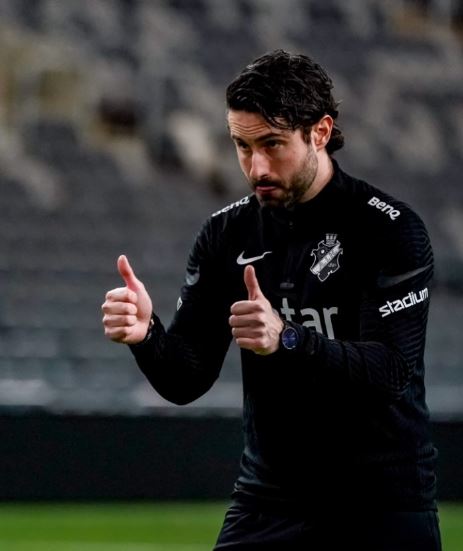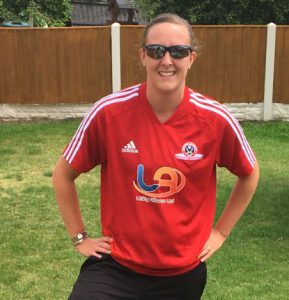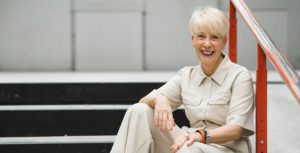Max's story
Max, you were a football player on a high level in Sweden and currently responsible for Core Values at AIK Fotboll. What is your personal experience with discrimination and homophobia in football?
I played at a high level in Sweden, and I have always loved to play the game and I still do, but early on I discovered that the environment around football wasn’t an environment where you could be who you want to be. I felt I was supposed to fit in this stereotype of ‘being a man’, an environment where expressing emotions isn’t the right way to be. You must fit in; you must show yourself like you can take on anything without even blinking and that wasn’t for me.
I think I was 12 or 13 years old when I made a mistake on the pitch, and my parents always said, “if you are happy, smile, if you are sad, it is ok to cry”, so I started to cry because I was so embarrassed about the mistake. I will never forget my coach yelling “stop acting like a fucking bitch, get your shit together and be a man”. I remember trying to swallow all the tears and just wanting the game to end and leave the pitch. Since that day, I have tried to fit in and be like everyone else.
Everybody had emotions, but everybody was trying to fit in and be a part of this even if everybody didn’t feel good about it, so from that day one it was a constant battle of just trying to be a person that environment and culture wanted me to be, and it was hard because it was the same in school. I was not man enough, not tough enough, not cool enough, I was never enough. So, when I started playing football and I was quite good at it and started playing with the best teams it was like a dream come true, but it was at the same time a constant battle to fit in and that, in the end, destroyed my love for being in the sport.
I quitted playing when I was 25-26 years old, on a high level because I still love playing football, but I didn’t love to come to the training grounds, come to the team and act like someone I was not, so I decided I wanted to stand up for what I thought was right.
I started talking about this culture and this environment and I was nervous because I didn’t know how my teammates and friends would take it, but the thing is that almost immediately people were like “oh finally, thank you, this is so important that we talk about it because I don’t like it either”; so why can’t we just start to act different?
And that was the time when I found out there is a lot of work to be done, so I quitted playing and use all the contacts that I have and the name that I build on myself to go out, visit clubs, visit companies, schools, just to talk about the importance of letting people be who they are and letting them express emotions or express themselves, that we should create a culture where everybody feels secure to be who they are, because we are always human beings first. We are human beings playing football. If you take care of human beings, make human being feel respected, who they are, listen to, care about, they will perform.
Talking about human qualities and human values isn’t something we do instead of playing football, it is something that would make the football playing even better, so that is kind of my journey where I am now, that I discovered that isn’t the culture people want, it is just a culture that just keeps on living until we say stop. And I think we should have said stop a long time ago.
AIK Fotboll developed a programme focused on education in values and inclusion for a couple of years ago. The club was the first club in Sweden to implement a programme like this. Could you tell us more about it?
If you look at AIK Fotboll, we are pretty known for our work with values, actually in all Europe because of the way we do it. We have our values that from the first time you put on your AIK jersey from 5 years old. You play in AIK style, which is the name of our values. So, from 5 years old until 19 years old and then in men’s and women’s teams we have this special educational programme. We talk about the values, what they mean in real life, what they mean in our environment, how we show each other respect in AIK and how we should be respected in society.
We have these topics, for example one is about macho culture, one is about homophobia, one is about girls playing football versus boys playing football. So, if you ask me, we have this really good educational programme that every kid goes through, so if you play in AIK from 5 years old up to one of the highest teams you will go through this educational programme. We talk about the values every year and in different kinds of ways every year, so we teach and educate 1,600 kids, 500 coaches and about 3,000 parents every year with different topics.
Has there been lots of change the past years in terms of LGBTQ+ acceptance?
I think the biggest change is that we are talking about these subjects, we put value by talking about them and we actually work together to be better at letting people express themselves and be who they are, and we also want to create a culture where everybody can be who they are. We are taking coaches that believe in those values, we are bringing players and parents that stand for that kind of values. That is one of the biggest things when you recruit players and coaches that stand behind our values. When I played, we didn’t talk about respect or equal rights. I can’t remember when my coach even mentioned it and it was different from team to team, but now we talk about it all the time.
I pretty much think that everything has changed for the better, but we still have problems, we still have a way to go. We still have men’s players making a lot more money than women, we think we are already including, and, in some ways, we are, and, in some ways, we have a long way to go, but we are going in the right direction.
The first thing we need to do is to talk about it, the second thing is to make sure that the words are not just words, that it is led by the clubs and the people within the clubs, but then the next step is to create that environment where everybody for real feels secure too. And it takes time, but I think if we are talking in AIK, we are taking huge steps and I think we are getting there, we are working towards it every day.
But changes take time, and sometimes changes should take time. We need to make sure that when the time is right everybody really feels secure, and the clubs and the environment are run by people who believe in this. Step by step we are getting better, it is the same in society, we take steps, but we are not there yet unfortunately.
You are also part of the OUT! Network, how important are collaborations such as the OUT! Network and collaborating at a European level?
It was really interesting to listen to how other clubs and how they are including the supporters in their work and how they think about these questions. I didn’t think so many clubs were working with these kinds of questions and really taking it seriously.
The thing is if we just do it in Sweden or in The Netherlands, we are not taking a step, we need to do it everywhere and we need to walk together, because we compete on the pitch, not off the pitch. So, it was fun to be there and to give them the AIK way of thinking about it. And I think we have come quite far when it comes to working with these questions within the club. Some other clubs have come very far when it comes to working in society outside, but how we work in the club, I think we are role models even in Europe.
I strongly believe that every club in Europe or in Sweden wants to work with this, but the thing is they don’t know how, so I think that the meetings to share best practices are extremely important. This is the way forward. We need to learn from each other how to do it and understand that it is different in different countries. Cultures are different, so we need to work on it in different kinds of ways. What would work in The Netherlands might not work in Sweden and so on. We have to be really open on how we are attacking these issues and how we can tackle it.
It is extremely important that we meet, and more often actually, because it is not a work we should do just in Sweden or just the Netherlands, this is a work we really need to do together. I would love to have those kinds of conferences when we are willing to travel again more often because I think it is the way forward, and not just in football, in the way of making the world a more inclusive place. I think this is one of the roles that clubs should have, to be including and I think the will is there, is the how we need to talk about.
What is the added value of implementing an educational programme, like your Core Values, in local schools?
If we talk about AIK we have two schools, and those schools are working with the values that we have. I lecture and educate all the players and teachers, so we speak the same language and work in the same way. We work really close to our schools and they play with their team every day on school time together with the coach. We meet every day,
I use to tell them that if someone drops a pencil in the classroom, I will know about it, if you come late, I will know about it. So, we are close, and I think that it is an important thing if you want to connect with them, because otherwise it is going to be school and football, and we want to make it in life, it doesn’t matter where you are.
And this year, it is hard when you can’t meet all the players, it is hard when we have this situation because I can send out papers and record stuff, but I want to look them in the eyes and talk with them and have this discussion because it is the discussions and the way we talk to each other, how we respond to each other, that is the thing, all these moments where we might not think the same, but we start talking to each other, there is the change.
So, for me I really hope that we get the opportunity to meet each other again this year so we can continue to talk about our values, and I would like to put a lot of effort in this year in equal rights and how to work with macho culture even more within our club, so my main goal is to be able to make that a better place, so I hope we can meet up, otherwise it will be hard to educate 1600 people on the pitches.
What obstacles did you face regarding people who didn’t agree with these topics?
It would be naive to think that when you walk into this kind of subject and try to break down the stereotypes and structures, which are very much alive in the society, of course, you will meet people that don’t like this or think that this is the right way.
Some people mean that they need to change themselves. Just look at the macho culture, I have to, for example, talk about what it is to be a man. To walk into a room and talk about that, of course some people want to give it away, but I have to say that most people think this is really good, both parents, coaches and players.
I thought I was going to get a lot more reactions and a lot more people backing down and don’t wanting to do this, but most of the people have been really open to this and understand that this is a big part of the development as a football player and development as a human being, because every player and every coach wants to be professional, but everyone won’t make it there, but everybody is going to be a taxpayer and a part of the society. It is about being a part of something bigger.
But there was some people that didn’t like it much, to say the least, so I had some issues, where the police and the authorities had to help me, but there are always going to be people that don’t like what I am doing, but for me is like the more resistance you get the more they tell you that this is important. If they talk and they show reaction is just an answer that you are doing the right thing, because if you get reactions from those kinds of people you will make an impact, because they would never react if they didn’t see you as a threat.
So, it was hard, and it was scary sometimes, but at the same time I knew I was doing the right thing.
How do you address these challenges?
First, we have to acknowledge that people are different. You can’t talk in the same way to different people and expect the same results. From that point of view, we have to learn and create relations with the people we are talking to, so you understand how these questions are or how you should talk to them to make them understand. That is the first thing to acknowledge that people are different.
If we start within the club, if you are going to be part of AIK Fotboll as a player or a coach, you need to stand behind our values and you need to sign that you are standing for those values and if you don’t, I won’t say that you are a bad human being, that is not my job to do, but then you can’t be a part of this club, because this is what we stand for.
I think quite a few people wake up in the morning and say, “today I am going to be really bad against people, I am going to be so sexist” and so on. I think a lot of people are just doing what they are being taught, what they have been doing their whole life and the way they were treated.
The biggest thing is to make people understand why we are doing this and what is going to give us and make people understand that working with equal rights or letting everybody be who they are and want to be is something that is going to give us strength. All of us. It is not something we do instead of playing football, to work with human values and create an environment where people feel welcome and safe will make their performances better over time. So working with values isn´t instead of playing, it is football.
So, I think that is the way to start, to make people understand. When they understand, a lot of them change directions and change their way of thinking. And then we will start to make good things. On and off the pitch.





